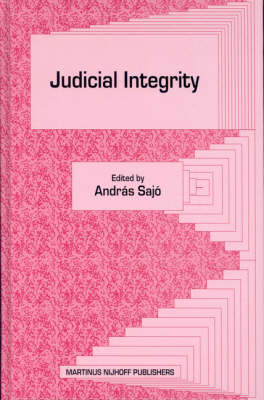
Judicial Integrity
Martinus Nijhoff (Verlag)
978-90-04-14005-9 (ISBN)
Traditional separation of powers theories assumed that governmental despotism will be prevented by dividing the branches of government which will check one another. Modern governments function with unexpected complicity among these branches. Sometimes one of the branches becomes overwhelming.
Other governmental structures, however, tend to mitigate these tendencies to domination. Among other structures courts have achieved considerable autonomy vis-à-vis the traditional political branches of power. They tend to maintain considerable distance from political parties in the name of professionalism and expertise. The conditions and criteria of independence are not clear, and even less clear are the conditions of institutional integrity.
Independence (including depolitization) of public institutions is of particular practical relevance in the post-Communist countries where political partisanship penetrated institutions under the single party system. Institutional integrity, particularly in the context of administration of justice, became a precondition for accession to the European Union. Given this practical challenge the present volume is centered around three key areas of institutional integrity, primarily within the administration of justice:
First, in a broader theoretical-interdisciplinary context the criteria of institutional independence are discussed.
The second major issue is the relation of neutralized institutions to branches of government with reference to accountability. Thirdly, comparative experience regarding judicial independence is discussed to determine techniques to enhance integrity.
List of Contributors;
Introduction Judicial Integrity Péter Hack;
Chapter 1: Impartiality: A Philosophical Perspective, Paul J. Kelly;
Chapter 2: Integrity and Neutrality of Legal Institutions, Guy Haarscher;
Chapter 3: The Independence of the Judiciary: An Economic Analysis of Law Perspective, Eli M. Salzberger;
Chapter 4: History, Politics and Judicial Independence, Barry Friedman;
Chapter 5: Politics and Political Independence of the Judiciary, Lech Garlicki;
Chapter 6: The Acoustics of Accountability—Towards Well-Tempered Tribunals, Roderick A. Macdonald;
Chapter 7: Independence and Accountability of the Judiciary in Italy: The Experience of a Former Transitional Country in a Comparative Perspective, Giuseppe Di Federico;
Chapter 8: Independence and Accountability of the Judiciary—Two Sides of a Coin: Some Observations on the Rule of Law in Central Europe, Erhard Blankenburg;
Chapter 9: Courts in Russia: Independence, Power, and Accountability, Peter H. Solomon, Jr.;
Chapter 10: Judicial Independence in Eastern Europe with Special Reference to Hungary, Attila Rácz;
Chapter 11: Judicial Independence in the Accession Countries of Central and Eastern Europe and the Baltics, Károly Bárd.
| Erscheint lt. Verlag | 28.5.2004 |
|---|---|
| Sprache | englisch |
| Maße | 155 x 235 mm |
| Gewicht | 721 g |
| Themenwelt | Geisteswissenschaften ► Philosophie ► Ethik |
| Recht / Steuern ► EU / Internationales Recht | |
| Recht / Steuern ► Privatrecht / Bürgerliches Recht ► Berufs-/Gebührenrecht | |
| ISBN-10 | 90-04-14005-0 / 9004140050 |
| ISBN-13 | 978-90-04-14005-9 / 9789004140059 |
| Zustand | Neuware |
| Haben Sie eine Frage zum Produkt? |
aus dem Bereich


